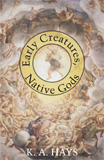Review by Todd Davis
Carnegie Mellon University Press
5032 Forbes Avenue
Pittsburgh, PA 15289
ISBN: 978-0-88748-547-3
2012, 71pp., $15.95
www.cmu.edu/universitypress/
A longing for and a negotiation with the earth marks K.A. Hays’s splendid second collection, Early Creatures, Native Gods, which is comprised of five named sections—“Renunciation,” “Lament,” “Downeast,” “Early Creatures,” and “Creed.” These section-titles serve to structure our movement–or, better yet, our pilgrimage–with the poet, and while we travel with her to such landscapes as Italy and the eastern shores of the United States, Hays ultimately guides us deeper into the natural world, establishing a possible shared “creed” between speaker and listener. (Yes, these poems seem to speak in a hushed and passionate whisper and ought to be read aloud to at least one other person. Allowing them to stay upon the page and in a solitary head will not offer them the oxygen they need.)
In an effort to emphatically claim this territory, Hays begins her book with a theological argument of sorts in the initial poem, “Assumption,” which both refers to the taking up of Mother Mary to heaven, as well as to the philosophical “assumption” the writer will stake her claims upon as the book moves forward.
“Assumption,” an ekphrastic poem which responds to the “Assumption of the Virgin” by Antonio Allegri da Correggio, a painting the poet has gazed upon during her travels, does not satisfy the speaker in the poem with its depiction of heaven. This display of otherworldliness “looks no more soft and endless / than a yellow dinner plate,” and the poet, while rooting her feet to the floor, proclaims that
Even the Mother of God
would rather be browsing the market outside,
melting on her tonguea dollop of the cheese made after the cows
have eaten April’s pungent grass.
She concludes with the contention that the “Virgin’s truest heaven” is “a field where the cows still graze, / and mosquitoes mill, / the child unborn, the star / a guide to no particular barn.”
This is one of Hays’s greatest strengths: her ability to undo the other-worldliness of mythology by emphasizing the earthly stage our myths must parade across. In doing so, Hays empathizes with the plight of these estranged “actors,” the manner in which they are forever caught in the stories that ultimately seek to control them, to make them obey based upon some theological or ideological dogma. Hays’s poetry opens the pasture gate and sends her readers beyond the corralled fences of religious doctrine without losing sight that there is some impulse, some need to understand the world through a spiritual dimension.
As the speaker says in “To a Rational God,” “Really, Lord, faith seems a grinning, whistling business, / skepticism a way of slowly offering a hand.” What a splendid metaphor for the poetic work Hays sets about to do–poems that offer a hand, that part the veil of religious mythology: not with the desire or intention to harm those who believe, but to point toward a way of “being” on earth not dependent upon an otherworldly promise.
Hays’ poems, however, do not pose in hubris as somehow above the incomprehension our own mortality presents, and at times plagues us with. Hers is a prosody of compassion, of irony, of prodding and imploring the reader to see the world anew. Without the ready-made answers of religion or ideology, she continues to accept that very human need to call out, to create a “god” in our own image, and such titles as “A Human God Is Not the Same as God” and “To the Unpersoned God” offer insight into Hays’s philosophical wrestling that culminates in the long poem, “Early Creatures,” which is divided into seven sections and places at center stage the complexities of the natural world that draw Hays’s attention, as well as the echo of what our religious belief makes of that world. As the speaker says of molting ducks at sea in the poem’s second section:
The sea casts on and purls them in, a fog
slips through, night settles down, their heads
tuck into dark, bedraggled wings. (I fear the voice of godmay be no more than wind at doors, the settling groan
of mindless airs. The world is touched
by the grandeur of these mindless airs, by minds
that hear a god in loose-hung doors.)
Put simply: for Hays the secular is the sacred. In her cosmology, religion and its trappings often demean or falsify the holiness of nature in trying to make the world something other than itself. To call Hays a religious poet is to assert that dogma or doctrine, belief and doubt, ultimately cannot control the most honest of human responses, and, thus, as the book concludes with “The Mass Has Ended Go in Peace,” we are instructed by her benediction that our going is “not in knowledge, but in calm; not in indifference, / but nearly.”